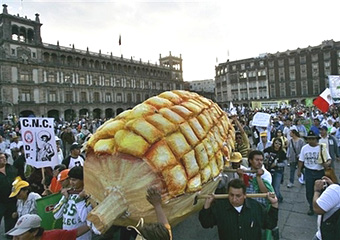
|
 |
 |
 News Around the Republic of Mexico | February 2008 News Around the Republic of Mexico | February 2008  
Mexico Lists NAFTA Disasters
 Prensa Latina Prensa Latina
go to original


| | Demonstrators carry a homemade replica of a corn during a mass protest in Mexico City, Thursday, Jan. 31, 2008. Thousands of demonstrators belonging to different organizations protested against the removal of import tariffs on farm goods from U.S. and Canada, as agreed by the North American Free Trade Agreement, NAFTA, timetable. Mexican farmers complain they won't be able to compete with U.S. farmers who can sell cheaper products because they receive government subsidies. (AP/Eduardo Verdugo) | | |
Mexico City - The Mexican Agriculture and Cattle Farming Commission of the Chamber of Deputies issued a detailed analysis on the effects of the North American Free Trade Agreement (NAFTA), clearly explaining why it has been a disaster for national agriculture.

The report said that, since the signing of the agreement, indices of poverty and marginalization have risen dramatically in the countryside.

Commission president, Hector Padilla, pointed out that one must be blind and deaf to not be aware of this reality.

The study noted that after NAFTA signed between Mexico with the United States and Canada, financing in agriculture fell more than 90 percent and national production of improved seeds was totally eliminated, left to the thirst of the transnationals.

Also, the domestic fertilizer industry is closed and producers now depend on increasingly expensive imports while programs of technical assistance and training aimed at rural producers were cancelled.

Supported by enormous subsidies of the United States, bean prices as well as the corn tortilla, basic Mexican staples, rose while machine costs and pesticides increased exorbitantly, it added.

The deputies pointed out the Mexican countryside is in the sharpest crisis of its history, steeping its population in poverty and massive expulsion towards the United States. In the past few years, three million Mexicans emigrated.

The commission assured that it is not only the interest of rural producers that are at risk but the stability of the nation due to the insecurity of basic food supply, and become an issue of nutritional and national security. | 
 | |
 |



